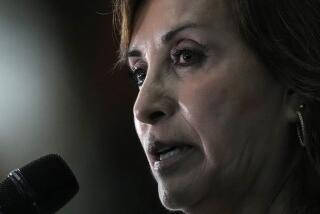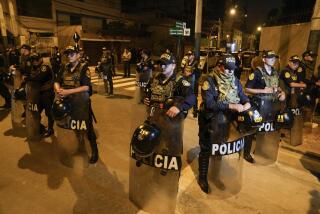Luggage With 24 Gold Bricks Described at Marcos Trial : Fraud: The former Philippine first lady sobs as evidence piles up at her feet. Her attorneys complain of “below the belt tactics.”
- Share via
NEW YORK — With suitcase loads of prosecution evidence against her literally piling up at her feet, former Philippine first lady Imelda Marcos broke down sobbing Thursday at her fraud and racketeering trial, which was then suspended for the day as her blood pressure soared.
The interruption came moments after a U.S. Customs agent took the stand and began identifying several extremely heavy suitcases that were among the 300 to 400 examined when Mrs. Marcos and her late husband, deposed dictator Ferdinand Marcos, arrived in Hawaii after fleeing a popular uprising in Manila.
Contents of the suitcases, still to be detailed, include business and legal documents as well as a “tremendous amount of jewels and luxury items as well as money,” agent Leslie Kinney said.
Mrs. Marcos, 60, began to cry when the customs officer testified that in one piece of luggage he had found an embossed case inscribed: “To my husband on our 24th wedding anniversary.” It contained “24 bricks of gold” weighing about 2.2 pounds each, worth a total of approximately $300,000 today.
The former first lady, whose husband died last September, broke into loud sobs after the jury was excused for lunch.
Gesturing at the suitcases stacked next to the defense table she cried: “They should include the dead body of Ferdinand Marcos there.” She spoke bitterly of her mementos being confiscated by U.S. authorities, then she collapsed into a chair, comforted by attorney Gerry Spence and her son, Ferdinand Jr.
She was escorted to the federal courthouse infirmary where she was examined by a family doctor who was attending the trial. The doctor said her blood pressure was very high and was fluctuating rapidly and recommended immediate rest.
Later, in Judge John Keenan’s chambers, Spence reported that Mrs. Marcos was feeling better. “She is up and wants to come back and (she) asked to come back,” he said, but added: “The doctor says . . . that her blood pressure continues to climb and that she should not come back right now.”
The afternoon session was canceled but the trial was expected to resume today. Mrs. Marcos is accused of looting her nation and skimming hundreds of millions of dollars out of government banks and agencies to make secret investments in jewelry, fine art and New York real estate.
Spence called Mrs. Marcos “a strong and courageous woman” who was under considerable stress at the sight of luggage that she hadn’t seen since her arrival in Hawaii four years ago. He said she was reliving “one of the saddest days of her life.”
Ben Cassiday, another defense attorney, accused government prosecutors of “ganging up on the widow” and using “below the belt tactics.” He said testimony about the anniversary gold bars was irrelevant to the criminal allegations and, therefore, unfair to use in the trial.
From the outset, Thursday was one of the most devastating days of the trial for Mrs. Marcos as physical evidence and testimony against her mounted.
Earlier, a Manila businessman testified that he was forced to turn over 60% ownership of his stevedoring company to a brother of Mrs. Marcos in order to keep a government contract to operate in the port of Manila.
Enrique Razon, founder of the stevedoring firm E. Razon Inc., said that just prior to the expiration of his long-term contract with the government’s port authority in late 1978 he was approached by Alfredo Romualdez, a younger brother of the first lady.
Razon said he was told that “other people close to Malacanang (the Philippines equivalent of the White House) were interested” in obtaining the port contract. Romualdez said “give me 60% and perhaps we can keep you there,” Razon recalled.
“He told me it was for President Marcos,” Razon testified. He said 60% of his ownership was transferred to the Marcos relative, the name of his company was changed to Metroport and he won renewal of the port contract.
Razon also testified that Marcos pressured him in 1981 to lie on an application for $30 million in foreign exchange credits from the Central Bank of the Philippines. He said two emissaries from President Marcos told him he had to fabricate the request or he would lose a government-guaranteed loan vital to a lucrative foreign contract his company had won.
Prosecutors contend that the Marcoses used the $30 million to secretly purchase a Manhattan skyscraper, the Crown Building.
More to Read
Sign up for Essential California
The most important California stories and recommendations in your inbox every morning.
You may occasionally receive promotional content from the Los Angeles Times.













